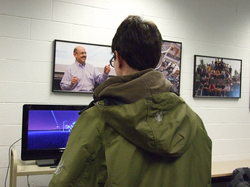University of Michigan expo shows serious games can be lucrative, too
The University of Michigan's Serious Games Expo may have been advertised as a means to prove learning needn't be boring, but its nomenclature was designed to filter out the unserious - those who came more to play games than to learn and network.
"This expo is for serious conversations about how technology and games can address social issues," said expo organizer Ken Ludwig, a lecturer in the U-M College of Engineering who teaches an entrepreneurship course where students model a startup company.

An attendee at the University of Michigan's Serious Games Expo plays a game on PlayStation 3.
James Dickson | AnnArbor.com
Only one of the dozen or so expo presenters Thursday came with games for games' sake: Dave Carter of the University of Michigan's Computer and Video Game Archive, a subset of the Art, Architecture and Engineering Library on North Campus.
Carter pitched the idea for a video game archive to the university's library administration and got the funding about a year ago. The library already has 1,000 games, representing just about every gaming system around - from the Atari to the Nintendo Wii. Though used largely by U-M students who have classes on North Campus, the video game archive is open to the general public.
The archive's presence was a counterpoint to the games and simulations most expo presenters developed to aid a social mission or for business purposes.
But technology can't solve all the world's issues - it created problems for at least one presenter. Bruce Maxim, a computer science professor at the University of Michigan-Dearborn, came with four games to display. One, "Street Smart Detroit," simulates life as a homeless person in Southeast Michigan to foster empathy on the part of the game player. Unfortunately, Maxim's hard drive died just minutes into the presentation.
One of the more exciting contributors was CrowdClarity, a student startup that could help automakers better determine which incentives to employ to drive business using sales predictions from rank-and-file workers who are closer to the ground than executives.
Auto dealers and others affiliated with the company are asked to predict the automaker's sales, company wide, for a given period - typically, a month. These numbers, said CrowdClarity founder Jonathan Carender, are oftentimes more accurate than what executives or industry experts predict.
Carendar said demand forecasting, using the input of employees, will help automakers build more precision into the incentives they offer. If predictions are bleak, the automaker will need to sweeten the pot; if predictions are strong, the automaker can save the money it would've put into incentive packages and invest it elsewhere.
CrowdClarity has partnered with Detroit-based retail consulting firm Urban Science to build a model of CrowdClarity for fictitious automaker "Universal Motors."
Carender likened the technology to the Hollywood Stock Exchange, which allows users to predict how strongly a movie will open, which actors are hot and which ones are not, and even who will win the Academy Award for Best Actor. Since 1998, the Hollywood Stock Exchange has predicted the winner of that award with 85 percent accuracy.
Take what the Hollywood Stock Exchange does, and replace the average user with an insider who sees the reality on the ground, and you have CrowdClarity.
Carender's challenge now is showing that his technology is sound and viable. Brian Tolle, founder and president of the Tolle Group, an Ann Arbor-based leadership consulting firm, has been mentoring Carendar.
"These are essentially sales conversations Jonathan is having," Tolle explained, "and what he's selling is himself and his credibility."Â
Traditional corporations are often hesitant to partner with start-ups, let alone start-ups run by college students. Tolle helps Carendar remain on-message during those sales conversations and address concerns appropriately.
Crowd Clarity's big break will come when it's able to convince an automaker to employ the technology. Once one automaker comes around, others will follow, Carender said.
"When companies start seeing what this technology is capable of, and how accurate it can be," Carender said, "the sky is the limit."
James David Dickson reports human interest stories for AnnArbor.com. He can be reached at JamesDickson@AnnArbor.com, or Twitter.com/JamesDDickson.

